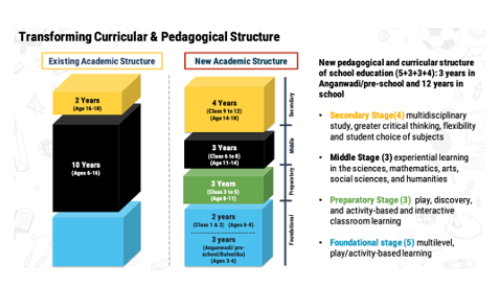The effect of the New Indian Education Policy (NEP) on Springdales School, Dubai

The recent National Education Policy 2020 in India comes 34 years after the previous policy, announced in 1986 and revised in 1992. It took six years of work and consultations with thousands of educators, policymakers, and members of civil society. It was truly a democratic effort and is highly aspirational in that it looks ahead to having an education system by 2040, that is second to none, with equitable access to the highest quality education for all learners, regardless of social and economic background.
 The immediate impact on Springdales School, Dubai is the move to a 5+3+3+4 system: The 10+2 structure of school curricula is to be replaced by a 5+3+3+4 curricular structure corresponding to ages 3-8, 8-11, 11-14, and 14-18 years respectively. This will include 12 years of schooling and three years of Kindergarten and pre-kindergarten. This will be introduced in the 2021-22 Academic Year.
The immediate impact on Springdales School, Dubai is the move to a 5+3+3+4 system: The 10+2 structure of school curricula is to be replaced by a 5+3+3+4 curricular structure corresponding to ages 3-8, 8-11, 11-14, and 14-18 years respectively. This will include 12 years of schooling and three years of Kindergarten and pre-kindergarten. This will be introduced in the 2021-22 Academic Year.
There are also a number of highlights that will have little or no effect on our day-to-day work at Springdales because these are already in place and have been operational for some time. For example, 1. Schooling from 3 years: According to the New Education Policy, from the age of 3, children will be part of Early Childhood Care and Education (ECCE) or in our case EYFS. 2. Promoting libraries: A National Book Promotion Policy will be formulated, and extensive initiatives will be undertaken to ensure the availability, accessibility, quality, and readership of books across geographies, languages, levels, and genres. 3. Changes in report card: The progress card of all students for school-based assessment will be redesigned. It will be a holistic, 360-degree, multidimensional report card that will reflect in great detail the progress and uniqueness of each learner in the cognitive, affective, and psychomotor domains. The progress card will include self-assessment, peer assessment, and teacher assessment.
There will be some quite revolutionary changes that will help our students greatly such as, the easing of board exams: The board exams for class 10 and 12 will continue. However, the board exams will be made ‘easier’ as they will primarily test core capacities, competencies rather than months of coaching or memorization. The ending of science-commerce-arts streams: NEP has eliminated the rigid separation of streams. Students will now be able to choose subjects like history and physics at the same time in class 11 and 12.
A focus on equity and inclusion: an entire section is devoted to the inclusion of Socio-Economically Disadvantaged Groups, it recognizes that children with disabilities are not receiving the attention required to learn and thrive in schools, primarily because teachers are simply not trained or equipped to address their learning needs. Thus, it makes an effort to ensure teachers are adequately prepared in the area of special education.
I would like to finally mention changes to Assessment and Evaluation: The Central Board of Secondary Education (CBSE) has always been known for its rote learning and memory-based assessments of students. This placed CBSE students at a disadvantage when it came to alternative curriculums that understood the developing significance of a progressive and global approach to evaluation; this was one of the reasons why most parents shifted their wards to an international curriculum. This new education policy has aligned more closely with Springdales by changing the way they used to see report cards and judge students on the basis of their results to a model of continuous assessment.
The NEP 2020 is ambitious and progressive, as was the NEP 1986 and the Right to Education Act 2009. There is an enormous opportunity for India’s considerable young population to become its biggest strength. We at Springdales are welcoming the changes that NEP brings and are now in the business of shifting long-held misconceptions of what the CBSE curriculum offers all students.


